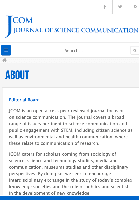
JCOM-Journal of Science Communication
Scope & Guideline
Bridging the Gap: Where Science Meets Society
Introduction
Aims and Scopes
- Interdisciplinary Approaches to Science Communication:
The journal explores the intersection of various disciplines such as sociology, education, art, and technology in shaping effective science communication strategies. - Public Engagement and Citizen Science:
A core focus on enhancing public engagement through citizen science initiatives, encouraging participatory practices that empower communities and foster dialogue between scientists and the public. - Culturally Relevant Communication:
Emphasizes the importance of culturally relevant science communication that resonates with diverse audiences, especially marginalized communities, to promote inclusivity and address social justice issues. - Evaluation and Impact Assessment:
The journal prioritizes the evaluation of science communication practices and their impacts on public understanding and attitudes towards science, ensuring accountability and continuous improvement. - Use of Creative and Artistic Methods:
Explores the integration of arts-based approaches in science communication, utilizing creativity to engage audiences and facilitate deeper understanding of scientific concepts. - Digital and Social Media Strategies:
Investigates the role of digital platforms and social media in disseminating scientific information and shaping public discourse around science, especially in the context of misinformation.
Trending and Emerging
- Inclusion and Social Justice in Science Communication:
Recent publications show a significant increase in discussions around inclusivity and social justice, emphasizing the need for science communication practices to address inequalities and engage marginalized voices. - Integration of Artificial Intelligence and Technology:
The role of AI and digital tools in enhancing science communication strategies is gaining traction, reflecting the technological advancements and their implications for public engagement. - Arts and Creative Approaches:
There is a growing trend towards utilizing arts-based methods in science communication, leveraging creativity to engage audiences and convey complex scientific ideas effectively. - Community-Centric Engagement Models:
An emerging focus on community-centric models of engagement, where local knowledge and perspectives are valued, and participatory approaches are prioritized. - Health Communication and Misinformation:
The COVID-19 pandemic has amplified the importance of effective health communication, with an increasing number of studies addressing misinformation and strategies for public health engagement.
Declining or Waning
- Traditional Science Journalism:
There is a noticeable decrease in publications centered around traditional science journalism, as the field shifts towards more participatory and community-driven approaches to science communication. - Purely Academic Perspectives on Science Communication:
Papers that focus solely on academic theories without practical application or public engagement aspects are becoming less frequent, indicating a shift towards more applied, real-world perspectives. - Focus on Western Frameworks:
A decline in papers that exclusively utilize Western frameworks for understanding science communication, as there is a growing emphasis on decolonizing science communication and incorporating diverse epistemologies. - Generalized Public Understanding of Science:
The once prevalent theme of broadly assessing public understanding of science is waning, with a growing focus on specific demographics and the nuances of communication effectiveness. - One-Way Communication Models:
There is a declining interest in one-way communication models that do not facilitate dialogue or interaction, as the field increasingly values two-way communication and engagement.
Similar Journals

SCIENCE AS CULTURE
Bridging Disciplines: Where Science Meets CultureSCIENCE AS CULTURE is a distinguished journal published by Routledge Journals, Taylor & Francis Ltd, focusing on the interdisciplinary intersections of science and culture since its inception in 1987. With an ISSN of 0950-5431 and an E-ISSN of 1470-1189, the journal has established a strong reputation in various academic fields, most notably holding Q1 rankings in Cultural Studies, Health (Social Science), History and Philosophy of Science, and Sociology and Political Science. The journal aims to provide a platform for innovative research that critically examines the social, cultural, and political dimensions of scientific practices and knowledge. Despite not being an Open Access publication, it remains accessible to a wide audience, bolstered by its impressive impact factor and the rigorous peer-review process that ensures the quality of published articles. As a key resource for researchers, professionals, and students alike, SCIENCE AS CULTURE invites contributions that challenge traditional perspectives and stimulate dialogue across the sciences and humanities.

International Journal of Communication
Connecting scholars and practitioners in communication.International Journal of Communication, published by USC Annenberg Press, is a premier open access journal dedicated to advancing the field of communication studies. Since its inception in 2007, the journal has provided a vital platform for researchers, professionals, and students to engage with cutting-edge research, theoretical frameworks, and empirical studies. With an impressive Q1 quartile ranking in Communication for 2023 and a notable Scopus rank of 156 out of 511 in the Social Sciences Communication category, the journal consistently contributes to high-quality scholarly discourse. It covers a wide array of topics, making it a crucial resource for those looking to stay informed about the latest developments in communication research. The journal's commitment to open access enhances its reach and impact, fostering a global community of academics and practitioners dedicated to exploring the complexities of communication in contemporary society. This makes the International Journal of Communication an essential read for anyone interested in understanding the dynamics of communication today.
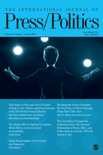
International Journal of Press-Politics
Advancing Insights at the Intersection of Communication and GovernanceThe International Journal of Press-Politics, published by SAGE Publications Inc, stands as a premier scholarly platform at the intersection of communication, sociology, and political science. With a distinguished history dating back to its inception in 2003 and maintaining its relevance through 2024, this journal is recognized in the academic community for its rigorous exploration of the dynamics between the media and political processes. The journal proudly holds a Q1 ranking in both Communication and Sociology and Political Science categories, placing it in the top tier of its field, underscored by its impressive Scopus rankings, which reflect its global influence and reach. With an intention to foster innovative research and discourse, IJPP is committed to being accessible, contributing significantly to the understanding of how press and politics shape societal narratives, thus serving as an essential resource for researchers, professionals, and students alike. Explore this esteemed journal to engage with cutting-edge studies that drive the field forward.
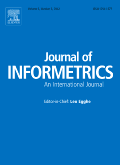
Journal of Informetrics
Innovative Perspectives on Information AnalyticsThe Journal of Informetrics, published by Elsevier, stands as a leading platform for interdisciplinary research in the realms of Applied Mathematics, Computer Science Applications, Library and Information Sciences, Management Science, Operations Research, Modeling and Simulation, and Statistics. Boasting an impressive 2023 impact factor that ranks it in the Q1 category across multiple disciplines, the journal features a robust Scopus ranking of 38/280 in Library and Information Sciences, placing it in the 86th percentile. This esteemed journal, headquartered in the Netherlands, operates without open access, ensuring a curated selection of high-impact research. Since its inception in 2007, the Journal of Informetrics has been pivotal in advancing knowledge and fostering academic discourse, making significant contributions to the study of information metrics and analytics, thereby appealing to researchers, professionals, and students eager to stay at the forefront of this dynamic field.
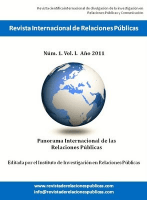
Revista Internacional de Relaciones Publicas
Bridging theory and practice in public relations research.Revista Internacional de Relaciones Publicas is a prominent open-access journal dedicated to advancing the field of public relations and communication research. Published by UNIV MALAGA, INST INVESTIGACION RELACIONES PUBLICAS, this journal has been pivotal since its establishment in 2011 in disseminating innovative research and insights related to public relations practices, theories, and trends globally. With the ISSN 2174-3681, the journal reaches a diverse audience, including researchers, professionals, and students, fostering a collaborative environment for knowledge exchange. Despite the absence of an HIndex or categorized quartiles, its commitment to high academic standards ensures the relevance and quality of published work. Situated in the vibrant city of Malaga, Spain, the journal encourages contributions that explore the evolving dynamics of public relations in contemporary society, making it an essential resource for anyone interested in the nuances of communication strategies and their impacts.
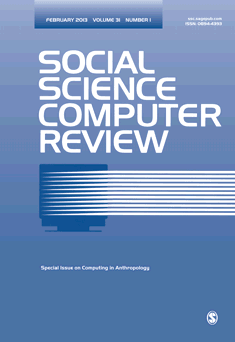
SOCIAL SCIENCE COMPUTER REVIEW
Advancing scholarship at the intersection of computation and social science.SOCIAL SCIENCE COMPUTER REVIEW, published by SAGE Publications Inc, is a premier peer-reviewed journal that has been contributing to the intersection of technology and social science since its inception in 1983. With an impressive H-index and categorized in Q1 across multiple disciplines including Computer Science Applications, Law, Library and Information Sciences, and Social Sciences (miscellaneous), this journal stands out as a critical resource for researchers, professionals, and students seeking to explore the implications of computational methods in societal contexts. The journal is widely recognized for its rigorous scholarship, evidenced by its high Scopus ranks in various categories, notably ranking #17 in Social Sciences - Law (98th percentile) and #9 in General Social Sciences (96th percentile), making it an essential publication for those looking to stay at the forefront of social science research. Though it does not provide open access, the journal's commitment to disseminating cutting-edge research ensures its vital role in advancing knowledge and fostering interdisciplinary collaboration. For those engaged in studying and applying computational techniques within the social sciences, SOCIAL SCIENCE COMPUTER REVIEW is a valuable and indispensable source.
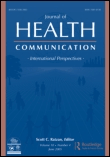
JOURNAL OF HEALTH COMMUNICATION
Exploring the Intersection of Communication and HealthJOURNAL OF HEALTH COMMUNICATION, published by Taylor & Francis Inc, stands at the forefront of research in the interdisciplinary field of health communication, a vital area in today’s healthcare landscape. With an impressive 2023 impact factor reflecting its influence and prestige, this journal is recognized in the top quartile (Q1) across multiple categories, including Communication, Health (Social Science), Library and Information Sciences, and Public Health, Environmental and Occupational Health. This accolade highlights the journal's engagement with key issues in health communication, making it a crucial resource for researchers, professionals, and students dedicated to improving health outcomes through effective communication strategies. The journal covers a wide range of topics from health literacy to media advocacy and public health messaging, providing a platform for innovative research that shapes health policies and practices globally. Published continuously since 1996, the Journal of Health Communication remains committed to fostering knowledge and engagement in the health communication discipline.

Momona Ethiopian Journal of Science
Exploring New Frontiers in Scholarly CommunicationMomona Ethiopian Journal of Science is a distinguished open-access journal that has been fostering scholarly communication in the realm of natural and computational sciences since its inception in 2009. Published by the Mekelle University, College of Natural and Computational Sciences, this journal provides a platform for researchers, professionals, and students to disseminate their findings, share innovative ideas, and engage with cutting-edge developments within the field. With its ISSN 2073-073X, the journal aims to enhance scientific discourse by welcoming high-quality manuscripts that address a variety of topics relevant to the Ethiopian and broader scientific communities. Although specific metrics like HIndex and Scopus rankings are currently unavailable, Momona’s commitment to open access ensures that its content is readily accessible, promoting a collaborative atmosphere conducive to research advancement. Located in Mekelle, Ethiopia, this journal not only contributes to local knowledge production but also aligns with global academic trends that emphasize accessibility and interdisciplinary collaboration.

Revista Eureka sobre Ensenanza y Divulgacion de las Ciencias
Transforming Pedagogy with Cutting-Edge ResearchRevista Eureka sobre Ensenanza y Divulgacion de las Ciencias is a premier open-access journal dedicated to advancing the fields of education and science communication. Published by the University of Cadiz in Spain, this journal has established itself as a vital platform since its inception in 2004. With an ISSN of 1697-011X, it aims to disseminate innovative research and pedagogical strategies that enhance the understanding and teaching of scientific disciplines. As of 2023, it holds a Q3 categorization in Education with a Scopus rank of #989/1543, reflecting its commitment to academic excellence and relevance. The journal's open-access model ensures that valuable research is readily available to educators and researchers worldwide, fostering a community engaged in the promotion of effective science education. With a focus on bridging theoretical and practical applications, Revista Eureka invites contributions that spark dialogue and inspire new methodologies in science teaching and dissemination.
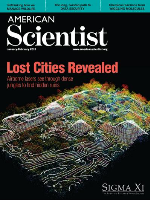
AMERICAN SCIENTIST
Your Gateway to Cutting-Edge Research.AMERICAN SCIENTIST is a prestigious multidisciplinary journal published by SIGMA XI-SCI RES SOC, renowned for its commitment to disseminating high-quality scientific research and insights since its inception in 1946. With an ISSN of 0003-0996 and an E-ISSN of 1545-2786, this journal serves as a valuable resource for researchers, professionals, and students alike, seeking to engage with current scientific discussions across various disciplines. Though it is not an Open Access journal, its articles are well-regarded in the academic community, evidenced by its Scopus ranking, placing it in the top 80th percentile among 88 multidisciplinary journals. Covering a wide range of topics, AMERICAN SCIENTIST aims to bridge the gap between science and the public by providing accessible writing that encourages informed dialogue around scientific advancement. With its extensive historical range from 1946 to 2016, it continues to be a critical platform for the exchange of innovative ideas and research findings that shape the future of science.